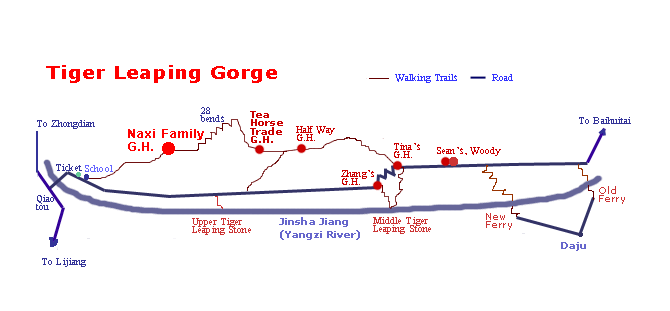Hiking the Tiger Leaping Gorge – by GEORGE BRAINE

I was jolted awake with a searing pain in the chest and heavy alcohol fumes on my breath. It was severe heartburn. Soon, the diarrhea started. A large dose of Imodium, which I always carry on my travels, slowed the runs.
I was in the lovely, ancient city of Lijiang in Yunnan, China, on a week-long visit. The previous evening, I had shared a bottle of “Cabernet” with my guide Haba and another friend. China is rife with fake wines, but I had paid a high price and the label said “Great Wall”, a reputable brand. Yet, I had been duped.
When Haba arrived for the planned hike to Tiger Leaping Gorge, I was in no state to travel. But more Imodium and lots of water gave me the confidence to face the 100km, 2-hour bus ride to Qiaotou, the starting point of the hike. The weather was perfect: clear views and dazzling sunshine that helped subdue the cold.
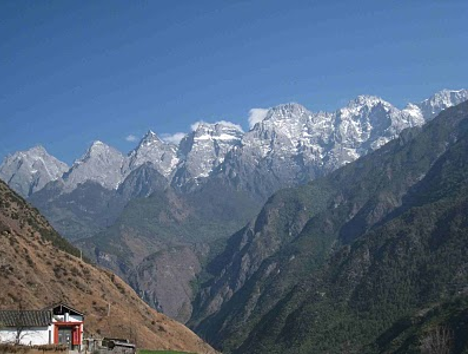
The name, Tiger Leaping Gorge, had intrigued me. Having seen the Yangtze in Shanghai, where hundreds of boats and freighters churn the kilometers wide river into a muddy color, and further upriver in Wuhan, where, slate colored and wide, it flows more sedately, I wondered how a tiger could leap across the river. I would soon find out.
My bowels held during the bus ride, and a hunk of fresh beef hanging at the entrance to a small eatery in Qiaotou was too tempting. So, Haba and I enjoyed bowls of steaming hot beef noodles. As we set off on the hike, we were greeted by a stunning view of the Jade Snow Mountain (5,596 meters). The upper Yangtze River, a narrow streak of blue for a change, snaked far below. We walked in the shade of the Haba Snow Mountain to our left.
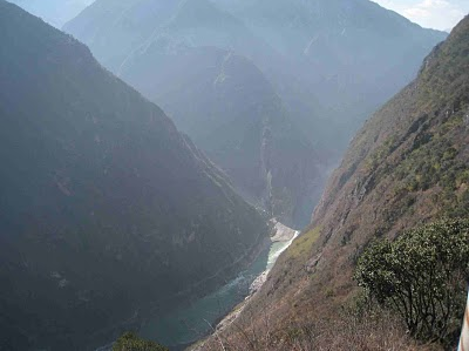
The upper Yangtze river snaking far below
Haba was from the coastal province of Fujian. An unabashed romantic, he had qualified as a licensed guide after university and come to Lijiang because he loved the weather, the mountains, the easy lifestyle, and the various minority groups, such as the Naxi and the Bai, that lived there. Cheerful and enthusiastic, Haba kept me going during the hike. I couldn’t have wished for better company.
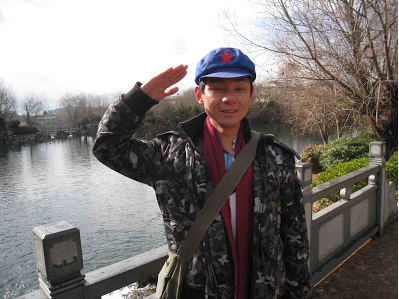
Haba
Soon after we began the hike, Haba was running and squatting behind bushes. Obviously, late onset diarrhea!
The map showed a forbidding near vertical climb to the Naxi Family Guest House where we had planned to stay the night. We saw no other hikers, only mule drivers offering rides. They were a nuisance on the narrow path and Haba fended them off. Before long, my weakened state began to show and the climb became too hard for me. I lay down on a flat rock to rest, and, despite Haba’s efforts, one mule driver had refused to leave our side. He obviously knew I was done for. His persistence paid off because I decided to ride the mule up to the guest house.
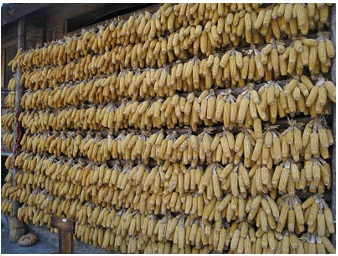
The Naxi Family Guest House turned out to be a treat. I walked in to a lovely courtyard hung with drying corn, and a comfortable room heated by an electric blanket. The bathroom was clean and hot water flowed. When Haba made the bookings for our accommodation, I had insisted on a western-style toilet and a warm bed at overnight stops.
Haba suggested that I hire the mule the next morning as the path would be steep, so we asked the mule driver to arrive at 9.30am. After a simple but delicious dinner and a hot shower, I went to bed exhausted and slept soundly.
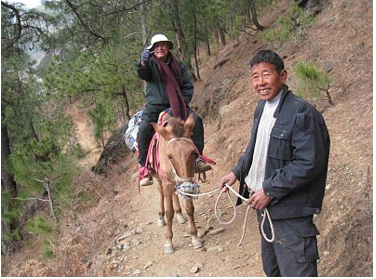
I walked out just after 8.00am and saw the mule tethered outside. The mule driver had turned up early, just to make sure that we wouldn’t give him the slip! After a wonderful breakfast of pancakes with walnuts and honey, we started off with me on the mule. I learned that the mule driver was a 46-year old local Naxi. He had two children, one at university.
Although I kept nearly sliding off the saddle due to the steepness of the trail, I was glad to be riding and not walking after seeing this sign: “Gain energy to tackle the 28 bends”. At some points, where the rocks were exposed, the trail was rugged and dangerous. At most places, it could be quite narrow, allowing only one person to walk through.
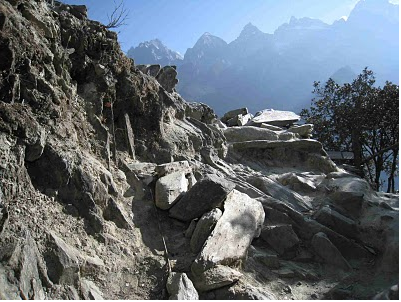
Within about an hour, we reached the highest point on the trail, at 2900 meters. I got off the mule here and sent the driver back. The weather was bitterly cold, but the sun shone brightly and added much cheer. We did not see many trees. Haba said that local tribes were illegally felling trees here, evidenced by some freshly cut pine logs along the trail. Except for the sound of the wind, the hike was eerily quiet. I did not hear the cry of birds or of any wild animals. Knowing local food habits, I suspect they had all been hunted and eaten.
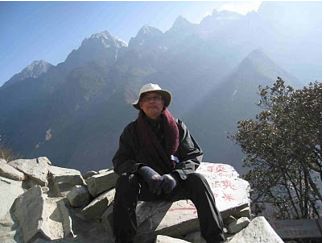
At 2900 meters
The view was breathtaking, but the path was only about a foot wide in most areas and quite dangerous, so I always stopped before enjoying the scenery. Haba mentioned a Korean tour guide who had fallen off while attempting to use his cell phone. The recovery of his body had taken three days and cost a tidy sum. Young Israelis, fresh from army service and full of bravado and risk, had also been victims.
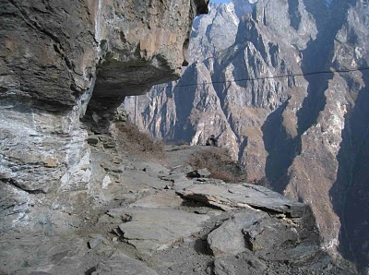
This was winter, so there was little greenery. But, the hilltops were a dazzling white with snow, and the hills turned from blue to almost black as they descended into the deep ravines below. In a country teeming with a billion people, I found the solitude and the rugged, forbidding landscape a welcome change. For two whole days, we only saw two other hikers, American teachers from Kunming, Yunnan’s capital. They were hiking in the opposite direction, towards Qiaotou.
Well into the afternoon, we arrived at the “Tea Horse Trade” guest house at Ya Cha village, to the welcome sight of the family gathered around the courtyard, playing cards and enjoying the bright sunshine on a cold day.
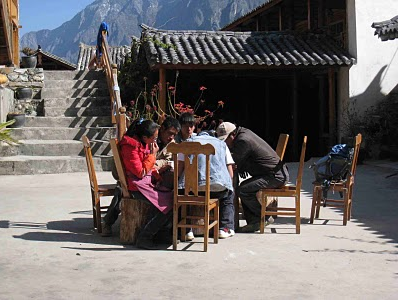
I had lunch at the guest house. They had a section called the “Thai Spa”, although not a Thai person was in sight! I risked a foot massage, which turned out to be mediocre, but even that was a relief to my tired feet. But, the family and other hangers on were full of cheer and I enjoyed the two hours we spent with them, reclining on a comfortable chair and putting my feet up. Life here must be tough. All the locals we saw were weather-beaten and almost blackened by the sun.
For the night, we aimed for Ben Di Wan village. As we drew closer, houses began to appear along with plots cultivated with beans and wheat. The greenery, even at ground level, was a welcome change from the grey and brown surroundings. The plots were not fenced; instead, sticks had been laid across, crisscross, as if to stop animals (cattle?) from wandering in, reminding me of chena cultivations in Sri Lanka.
Halfway Guest House, where we planned to stay, was much larger than the Naxi Family Guest House, and attracted visitors who had taken public transport from Quitou and climbed up from the road which ran below the hiking trail. That night, many young backpackers, both Chinese and Korean college students on break, turned-up for cheap dorm beds. I feared a raucous, sleepless night, but the students were quiet, perhaps lulled to sleep by the intense cold. We had long chats with Korean students both over dinner and breakfast.
My bed was comfortable but the toilet was leaking and stank of urine. The surly young manageress would not listen to complaints. In the morning, there was no hot water for a much needed shower.
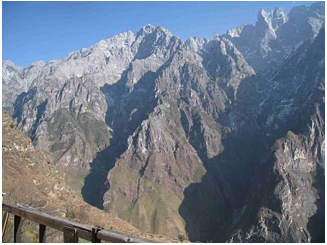
The trail was mostly downhill from Ben Di Wan, but it was slippery. As if unaware of the danger, frisky college students were taking selfies and horse playing, making me quite nervous.
For a late lunch, we were aiming for Tina’s Guest House, but signs painted on rocks along the path were occasionally misleading. For instance, after passing a sign that said “Tina’s 30 minutes”, we passed another sign saying “Tina’s 1 hour”. Upon reaching Tina’s, I thought the hardest part of the hike was over. How wrong it turned out to be.
During lunch at Tina’s (Haba likes potatoes fried with beef, a dish I also began to enjoy), Haba explained that the trail down to the river was extremely dangerous, and gave me the choice of continuing the hike or taking public transport back to Lijiang. After reaching the river, the path to our final destination, Walnut Garden village, would be narrow and even more dangerous. I was well into my 60s and not in the best of health. Although I traveled often, none was a hike like this, and I also wanted to see the river. So I decided to continue the hike.
As we set off on the nearly vertical trail down to the river, what I thought would only be difficult turned out to be the most dangerous part of the hike so far. In various places, there were chains, wires, roots, and branches I could hang on to, and Haba carefully guided me down. The nearly kilometer path down to the river took us about an hour, and I took my sweater and jacket off because it became warm. (More from nervousness, I guess!)
We soon passed an astonishing sight: a well-built man was being carried up, like a feudal lord, on a hammock slung between two poles by two scrawny, bare-chested, heavily sun-burned locals. The man smilingly told us that he “felt hot” at the bottom of the ravine so decided to be carried up.
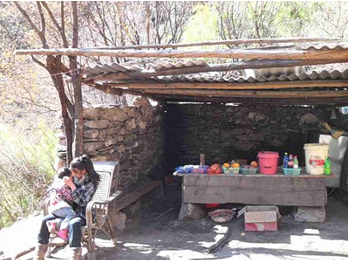
We passed a number of shacks where drinks and snacks were being sold. I wonder how much these people could earn on a typical day in winter, when only a few people would be hiking down to the river.
Finally, the river: a blue/green torrent, whitecapped, and rushing headlong between rocks. Haba and I sat down, watching and listening in awe as the water rushed past. The Yangtze is the longest river in China, the third longest in the world, and I was seeing it at a third location, thousands of kilometers from Shanghai and Wuhan, where the flow was slow. In appearance and speed, this was a wholly different, fearsome body of water.
No tiger could have leaped across on a day like this, but, when the water level was low, in dry weather, it may have been possible.
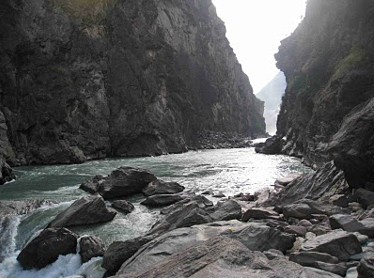
After resting for a while, we began to hike downriver in the direction of Walnut Garden village. The hike, with the towering mountains and blue skies above and the swirling water below, could have been exhilarating. Instead, it was nerve rackingly dangerous because the trail was quite narrow. In some places, we had to move sideways, crablike, holding onto the mountainside, and, because of the rocky overhang, we occasionally walked bent in half. A misstep would have hurled us down to sure death.
We were bothered middle-aged women, who lurked in the shadows, demanding cash for “maintaining the trail”. One woman wanted 10 Yuan, and after Haba began to argue with her, which could have turned nasty, I paid 2. Further on, someone had maintained the trail well, erecting rustic fences or a thick metal wire to hold on to. I later met the man, thanked him for his work, and paid him the 10 Yuan that he requested. He said that we were the only hikers to pass through that day.
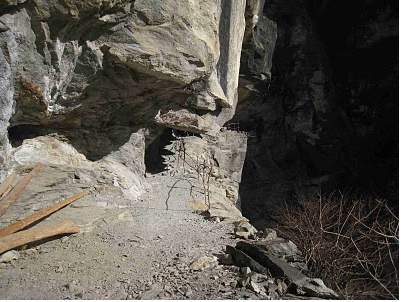
He had also put up a wooden platform well above the river, and also sold soft drinks and snacks. Exhausted by now, I lay down on the platform and soon fell asleep to the sound of the rushing river below. I am not sure how long I slept, but was awoken to the surreal sounds of an English lesson being conducted. Haba was teaching the man some basic English phrases, so that he could converse with passing foreigners!
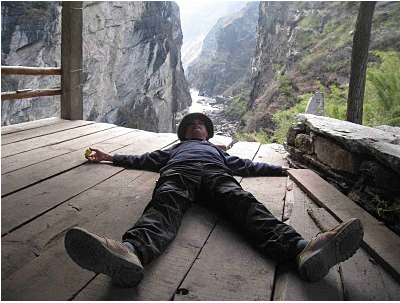
Eventually, we left the trail and began the climb towards Walnut Garden village. By now, it was late afternoon. We began to pass fields of wheat and barley, solidly built stone houses, and, instead of rickety fences, strong stone walls. The villagers appeared to be subsistence farmers and they all had some chickens, goats, pigs, and a cow or two in their backyards. Overall, they appeared to be content. After all, Beijing seemed distant: As the Chinese saying goes, “The mountains are high and the Emperor is far away”.
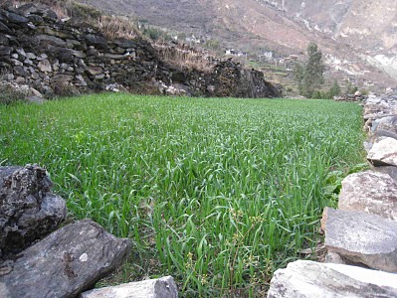
At dusk, we came to Woody’s “Chateau”, where we planned to stay the night. I quickly ordered a beer, soaked my tired feet in a basin of warm water, and relaxed on the deck with a pleasing view of the village.
GEORGE BRAINE
